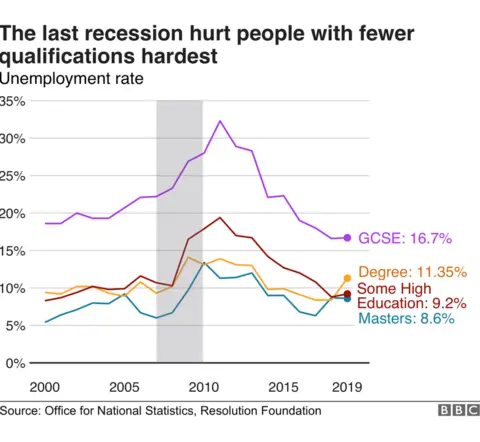Coronavirus: Wales 'more exposed' to economic crisis
 Getty Images
Getty ImagesUnemployment could rise to its highest level for more than a decade, according to a research group.
Almost one in five workers in Wales are employed in sectors that have shut down during the coronavirus outbreak, the Learning and Work Institute Cymru said.
Wales is more exposed than many other parts of the UK to the economic impact of lockdown, it has found.
Young people, women and those with few qualifications are most at risk, its research has found.
Wales has a higher proportion (18%) of workers employed in industries most affected by lockdown measures, than both England and Northern Ireland, according to the institute, while Scotland has the same.
It fears that if just a quarter of those 250,000 people lose their job, it would see unemployment in Wales reach a higher level than during the last recession following the financial crisis of 2008.
The economic crisis could be the worst since devolution in the late 1990s and the impact so severe it would wipe out five years of growth.
"While at this stage it is difficult to precisely predict the economic impact of coronavirus, we can say with some certainty that it will present government and all social partners in Wales with their most serious economic crisis of the devolved period of government in Wales," the L&W Institute's report said.

'I'm itching to get back to work'
Women are particularly at risk since 22% of female employees work in "shutdown sectors", compared to 15% of men.
Among them is Tina Sage, of Ely in Cardiff, who works as both a hairdresser and banqueting waitress.
She has served members of the royal family, Shirley Bassey and many celebrities but both of her jobs have been shut down because of lockdown and she remains unsure when either will resume.
"It's a worrying time and I'm itching to get back to work," she said.
"It's really important for me to have both jobs. I'll often go straight from the salon to events at City Hall or Cardiff Castle. To go from working two jobs to nothing and staying home is really strange."

'I'm hoping we can reopen in July'
Susan Trace, who owns hair salon Hair Flair in Llandaff, said: "It's very worrying as to when we will be able to open again.
"I'm lucky that the staff have been able to be furloughed and there's a grant to cover the bills but I'm hoping we can reopen in July."
Young workers are also more likely to work in industries, such as retail, catering and hospitality, that have shutdown, and many feel they have been forgotten in this economic crisis.
Qualifications levels are also influential.
The last recession in 2008 had particular impact on school-leavers across the UK when unemployment among students with GCSE-level qualifications peaked at 32.3%.
This compared with 13.4% for those with a masters degree.

David Hagendyk, director of the Learning and Work Institute Cymru, fears five years of jobs growth could be "wiped out" without strong action by governments and local authorities to support business and individuals.
"The coronavirus crisis is first and foremost a public health emergency, but it will also have a severe economic impact," he said.
"Wales will be more exposed than many other parts of the UK to the economic impact of the crisis and without strong action existing inequalities could widen further.
"We have seen in the past from 20, 30, 40 years ago that where you have long-term youth unemployment, it has an impact not just for a couple of years, but it has a lifetime impact in terms of people's long-term earnings and their mental and physical health."
What stands out from this report is who are most vulnerable when we begin to experience the long-term impact of lockdown.
It reminds us just how reliant employment in Wales has been on jobs in bars, restaurants, high street stores and tourism.
No one can predict how many businesses will find lockdown too tough, despite help from both UK and Welsh governments, and shed workers or close altogether.
But what this does highlight is the enormity of the challenge and how Wales could once again see high levels of youth unemployment as in the past. This is a very different group of people from those initially hit by the financial crisis of 2008 and it is a group who have fewer options open to them.
